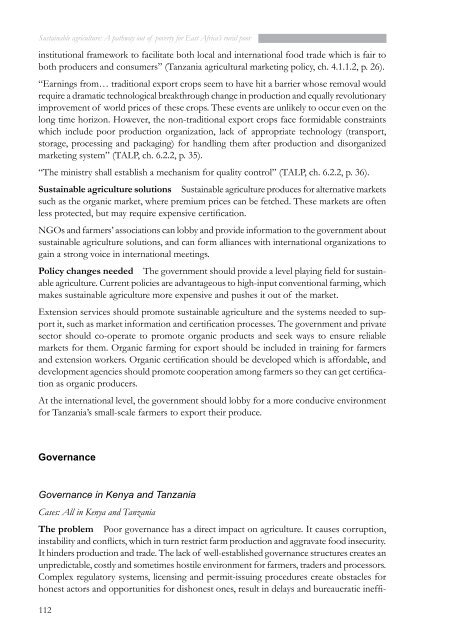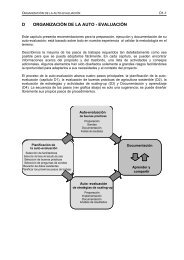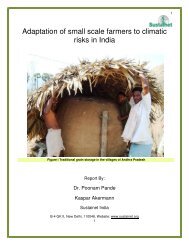cases from tanzania - Sustainet
cases from tanzania - Sustainet
cases from tanzania - Sustainet
Create successful ePaper yourself
Turn your PDF publications into a flip-book with our unique Google optimized e-Paper software.
Sustainable agriculture: A pathway out of poverty for East Africa’s rural poor<br />
institutional framework to facilitate both local and international food trade which is fair to<br />
both producers and consumers” (Tanzania agricultural marketing policy, ch. 4.1.1.2, p. 26).<br />
“Earnings <strong>from</strong>… traditional export crops seem to have hit a barrier whose removal would<br />
require a dramatic technological breakthrough change in production and equally revolutionary<br />
improvement of world prices of these crops. These events are unlikely to occur even on the<br />
long time horizon. However, the non-traditional export crops face formidable constraints<br />
which include poor production organization, lack of appropriate technology (transport,<br />
storage, processing and packaging) for handling them after production and disorganized<br />
marketing system” (TALP, ch. 6.2.2, p. 35).<br />
“The ministry shall establish a mechanism for quality control” (TALP, ch. 6.2.2, p. 36).<br />
Sustainable agriculture solutions Sustainable agriculture produces for alternative markets<br />
such as the organic market, where premium prices can be fetched. These markets are often<br />
less protected, but may require expensive certification.<br />
NGOs and farmers’ associations can lobby and provide information to the government about<br />
sustainable agriculture solutions, and can form alliances with international organizations to<br />
gain a strong voice in international meetings.<br />
Policy changes needed The government should provide a level playing field for sustainable<br />
agriculture. Current policies are advantageous to high-input conventional farming, which<br />
makes sustainable agriculture more expensive and pushes it out of the market.<br />
Extension services should promote sustainable agriculture and the systems needed to support<br />
it, such as market information and certification processes. The government and private<br />
sector should co-operate to promote organic products and seek ways to ensure reliable<br />
markets for them. Organic farming for export should be included in training for farmers<br />
and extension workers. Organic certification should be developed which is affordable, and<br />
development agencies should promote cooperation among farmers so they can get certification<br />
as organic producers.<br />
At the international level, the government should lobby for a more conducive environment<br />
for Tanzania’s small-scale farmers to export their produce.<br />
Governance<br />
Governance in Kenya and Tanzania<br />
Cases: All in Kenya and Tanzania<br />
The problem Poor governance has a direct impact on agriculture. It causes corruption,<br />
instability and conflicts, which in turn restrict farm production and aggravate food insecurity.<br />
It hinders production and trade. The lack of well-established governance structures creates an<br />
unpredictable, costly and sometimes hostile environment for farmers, traders and processors.<br />
Complex regulatory systems, licensing and permit-issuing procedures create obstacles for<br />
honest actors and opportunities for dishonest ones, result in delays and bureaucratic ineffi-<br />
112




